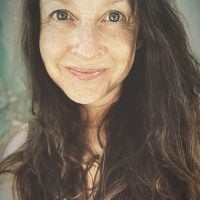View this post on Instagram
Codependency is deeply embedded in our cultural complexes—it’s healing, a lifelong practice of returning to sacred reciprocity with life itself.
This pattern is rooted in polarity and a disconnection from love…matter, the Mother, from the Earth.
The conditioning is everywhere—from movies, marketing, coaching tactics, quick-fix fantasies, to New Age polarity teachings and cultural courtship dances of leading with a lie of who we are in an attempt to secure connection…eventually ending up in a fun power struggle we think to be love.
It’s common to swing from one end of the polarity to the other in the name of healing without realizing the pattern is embedded within the split rather than the one habit, behavior, or expression of it.
This is why we can swing from enmeshment, for example, into a radical “sovereignty” that is almost emotionally aggressive in its orientation toward others while being disguised as freedom. Freedom from the enmeshment, maybe, but not from the pattern.
Recovering people pleasers often say, “Only people who benefitted from my not having boundaries will be upset if I set them.”
This statement sets us up to be perceived as “good” while the other is bad.
This statement is really only partially true.
It evades the fact that people pleasing is dishonesty, which people can have a legitimate reaction of pain, confusion, or anger to. It’s shocking when you discover someone has been dishonest with you for some time, right?
It’s hard to hold this if you lose yourself in others’ emotional responses to life.
People pleasing is an unconscious defense mechanism developed over time, often as a result of emotional pain accumulated from relationships.
Underneath these patterns, we can usually locate self-denial and often anger at self, as well as at others for not being able to meet the long unmet needs of the essential self.
Identity is formed around being “good” in order to be accepted, loved—to belong and feel safe.
We are even rewarded for it in our society—hello social media.
Yet, it is disconnected from authenticity.
It’s not the same thing as being kind, considerate, or compassionate—because it is rooted in shame.
Shame creates the split in codependent dynamics in the first place.
Shame is both grief of not having been loved the way we needed to be and the fear of not being loved now or in the future.
It feels like fear and grief at the same time in our body.
It is social.
It is painful.
And, it is woven tightly into the fabric of how Western culture functions, so of course it is how we learn to function within ourselves, with others, and in relationship to our spiritual life.
So, “I will no longer care what others think of me” is a defense to people pleasing, swinging into another way of relating that is the same kind of dynamic but the other side of it.
It may feel more empowered, but it’s not.
It’s harder to see how our codependent patterns can cause harm to others, especially if we are attached to seeing ourselves, or being seen, as “good” people.
When we lie to others about who we are, what we think, where we are at in life, how we feel about them to be pleasing, it impacts the capacity for love and intimacy.
It blocks the possibility of being loved for who we really are, which we need to learn is both safe and possible.
It only becomes possible through healing the rift within our heart that blocks us from belonging to our own authentic, essential self.
A self that is embedded in a reciprocal matrix of the love and life of the natural world.
So, it makes sense that we swing to another polarity, but this isn’t the healing.
The healing is learning to find and heal our relationship to a stable, grounded, and loving center, then returning to it over and over again.
The practice is the returning.
And, in our interdependence, to make amends when we’ve caused harm, while cultivating conscious grief practices and tending to our own unloved parts.
When rooted, it is much easier to discern generosity from caregiving, people pleasing from manipulation, and compassion from enabling.
We are meant to be interdependent beings, like the trees in the forest.
First, we must return to the forest of our own lives and remember how to tend to the land.
You are good.
We are all essentially good.
That is already done.
Now only to heal our broken hearts.
More love.
Not less.
~
AUTHOR: DR. MIA HETENYI
IMAGE: MUHAMMEDSALAH_/INSTAGRAM

Read 4 comments and reply